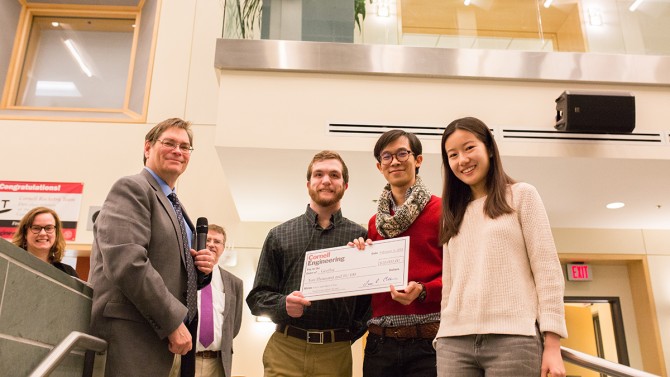
A prototype of Iko One, a smart herb garden.
Smart herbs, weather app among Engineering Innovation winners
By Syl Kacapyr
A smart herb garden for culinary connoisseurs and a weather app that tells you when to wear your favorite T-shirt are among the winners of the Cornell Engineering Innovation Award Competition, announced Feb. 6 during a project showcase in Duffield Hall.
The competition was open to teams of students from across the university; each team had to consist of a majority of undergraduate engineers. It was the first year the competition expanded outside of the School of Electrical and Computer Engineering.
“Expanding the competition really exposed the diversity and talent of students, and entries ranged from early concept phase to near-launch startups,” said Mike Thompson, director of undergraduate engineering programs and competition judge. “This competition really reflects the strength and vitality of the Cornell entrepreneurial spirit.”
Thirty-three teams entered the competition, and prizes were awarded in three categories, each coming with a $5,000 to $10,000 award thanks to alumni donors.
The Ron G. Kermisch ’88 Award for implementation of a fully demonstrated physical prototype went to Brella, a personalized weather app that summarizes local weather and suggests clothes to wear.
“It’s highly customizable so you can enter your own items or wardrobe into the app and you can customize it for what you consider to be hot or cold, because that’s different for everyone,” said Matthew Barker ’19, a computer science major.
The app is currently available in the App Store and is supported by Amazon’s Alexa device. The Brella team plans to add new features and aims to develop an Android version of the app.
The first Ronald ’57 and Frederick ’86 Fichtl Award for most innovative and developed concept was given to Iko One, a tabletop smart herb garden that allows for precise growing conditions to enhance the flavor of culinary herbs grown inside.
“Our target customer is a high-end foodie who might not necessarily have a green thumb, but wants tasty herbs year-round,” said Sivan Sud ’18, an engineering major who worked with students from the School of Hotel Administration and the College of Agriculture and Life Sciences to develop the prototype. “They just put one of our pods in, add water, and it grows.”
The team has secured a provisional patent and is working on options for users to adjust light and temperature conditions within the garden device to change the flavors of the herbs. Sud said the device eventually will be controlled through an app, where customers can also order new pods. The team hopes to have units for sale by the end of the year.
The second Ronald ’57 and Frederick ’86 Fichtl Award was given to Xboard, an electric skateboard engineered specifically for performing tricks. Hub motors and a battery are hidden inside the skateboard’s composite carbon-fiber deck, delivering a kilowatt of power and propelling the rider from zero to 20 miles-per-hour in just 50 feet.
Aaron Wisner ’19, a double major in electrical and computer engineering and in computer science, said unlike existing electric skateboards, Xboard is durable and lightweight enough for users to perform tricks.
The first Yunni and Maxine Pao Award for social innovation solving a pressing global challenge was given to a jaundice phototherapy device developed by the Cornell Engineering World Health team. Jaundice occurs when infants have a high level of bilirubin in their blood, a condition that can cause brain damage and other side effects if left untreated.
While hospitals are equipped with devices that reduce bilirubin by shining light onto an infant’s skin, many communities in developing nations don’t have access to such treatment. The World Health team’s device is designed to be portable and easy to use, making it an accessible alternative to hospital treatment.
The second Yunni and Maxine Pao Award was given to Geofloc, a water-filtration system for municipal treatment facilities. Instead of using gravity to filter out sand and other sediment from drinking water, Geofloc relies on vertical jets that push the water upward, suspending clumps of sediment in the middle portion of the filtration tank, which then filters out additional particles as they attempt to pass by.
Team member Kyle Rogers ’17 is a biological and environmental engineering major who said the filtration tank’s geometry is also a key element to the Geofloc system.
“If you can use geometry to settle out the particles more effectively, you can save space and process the water at a faster rate. We’ve actually found a geometry of the tank that can make removal efficiency as much as three times better than existing technologies,” said Rogers, who added that the efficiency means smaller tanks and cheaper construction prices.
The system was designed by a subteam of AguaClara – a student team that designs sustainable water treatment systems in disadvantaged communities around the world. Rogers hopes to test Geofloc as part of a future AguaClara project, and said it potentially could be marketable to filtration facilities in the developed world as well.
The application deadline for next year’s Innovation Award Competition is April 20.
Syl Kacapyr is public relations and content manager for the College of Engineering.
Media Contact
Get Cornell news delivered right to your inbox.
Subscribe


